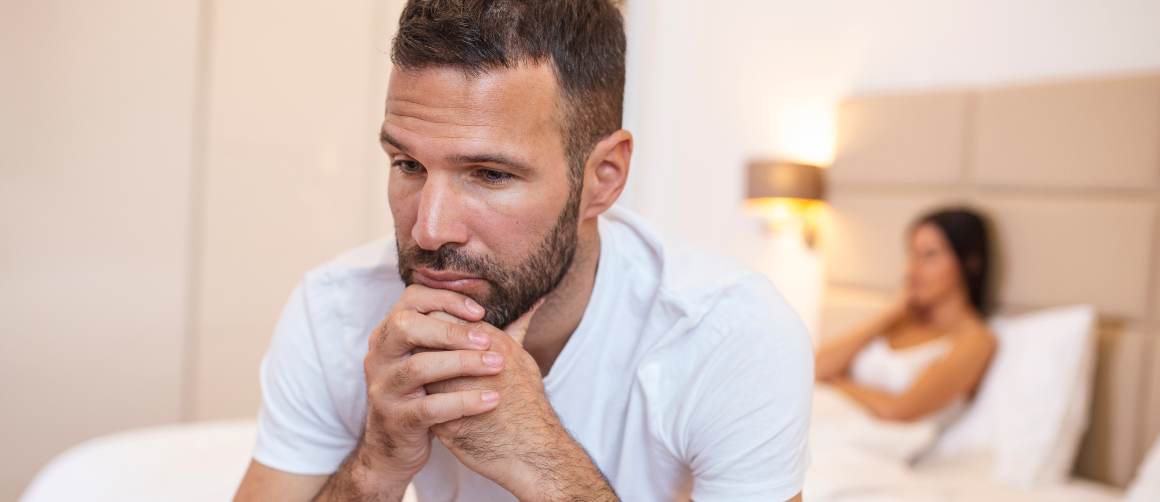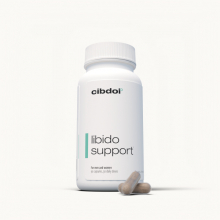What Causes Lack of Libido in Men?
Published:
Libido. Sex drive. However you refer to it, a healthy libido is important for overall wellbeing. But when libido seems to vanish, it can be worrying and frustrating.
Contents:
What causes lack of libido in men? There are quite a few potential culprits. By understanding the most common causes, you can get to the root of low libido and take steps to get your groove back.

What Is Libido?
Before diving into the causes of low libido, let’s define what libido actually is.
Libido refers to your overall sexual desire and sex drive. It’s your motivation to engage in sexual activities and have an interest in sex. Libido is different for everyone - some have an innately high sex drive, while others are simply less interested in sex.
Libido can fluctuate throughout life due to changes in hormones, stress levels, health status, medications, and relationships. A fluctuating libido is completely normal. But when libido takes a prolonged or permanent nosedive, it becomes problematic.
Do you feel like your sex drive just isn’t what it used to be? You may be dealing with low libido. Signs of low libido in men include:
- Lack of interest in sex
- Difficulty getting or maintaining an erection
- Trouble reaching orgasm
- Engaging in sex less frequently than desired
If you’ve noticed your libido declining and it’s distressing for you or your partner, it’s important to understand the potential causes so you can address them. Let’s explore some of the most common reasons for lack of libido in men.
Physical Causes of Low Libido
Physical health issues account for many cases of low libido in men. Let’s look at some of the most prevalent physical culprits.
Low Testosterone
Testosterone is the key male sex hormone. It plays a major role in libido and sexual function. Testosterone levels naturally decline as men age, but sometimes low testosterone occurs prematurely.
Symptoms of low testosterone include:
- Reduced libido
- Erectile dysfunction
- Fatigue
- Loss of muscle mass
- Increased body fat
- Irritability or depression
If you suspect low testosterone may be dragging down your libido, get a simple blood test. Your doctor can prescribe testosterone therapy if needed to get levels back up.
Medications
Many common prescription drugs can negatively impact libido as a side effect. These include:
- Antidepressants
- Blood pressure medications
- Benzodiazepines
- Opioid pain medications
- Ulcer medications
- Prostate medications
Talk to your doctor if you think your medications may be interfering with your libido. Your doctor may be able to adjust dosages, switch medications, or help you manage side effects. Don’t stop taking any medications before consulting your physician.
Obesity
Carrying around excessive body fat can lead to low testosterone and subsequently lower libido. The good news - losing excess weight can help restore testosterone levels and revive libido. Consider making lifestyle modifications like eating healthier and exercising more to get back in shape and get your sex drive revving again.
Chronic Illness
Certain health conditions are associated with low libido, including:
- Diabetes - High blood sugar damages blood vessels and nerves needed for optimal sexual function.
- Cardiovascular disease - Clogged arteries reduce blood flow necessary for erections.
- Neurological disorders - Conditions like Parkinson’s disease and multiple sclerosis can disrupt sexual signals sent from the brain.
- Chronic kidney disease - Hormone and chemical imbalances due to impaired kidney function can lower libido.
- Cancer and cancer treatments - Cancer itself, as well as radiation and chemotherapy, can depress libido.
Managing underlying health conditions may help improve libido problems. Work closely with your healthcare providers.
Low T Due to Injury or Surgery
Injuries, surgeries, and radiation therapy involving the pelvic region - like prostate cancer treatment - can sometimes damage nerves or blood supply needed for healthy sexual functioning. This may lead to testosterone depletion and low libido.
Options like testosterone therapy, erectile dysfunction medications, penile implants, and vacuum devices can help restore sexual function after pelvic injuries or surgery.
Psychological Causes
In many cases, psychological factors play a role in low libido. Mental and emotional health issues can dampen that lovin’ feeling.
Stress
Being excessively stressed or anxious can definitely kill your sex drive. And let’s face it, life these days is stressful! Chronic stress leads to elevated levels of cortisol - the body’s main stress hormone. Over time, increased cortisol acts to suppress testosterone production. The result? Plummeting libido.
Practicing stress-busting self-care is crucial. Prioritize sleep, exercise, social connection, relaxing hobbies, and mindfulness practices like meditation. Consider therapy if stress remains overwhelming.
Depression
Depression directly affects hormones and brain chemicals involved in sexual desire and satisfaction. Antidepressants used to treat depression may also contribute to low libido as a side effect.
If you suspect depression may be dampening your libido, speak to a mental health professional. Counseling and medication can help lift depression and restore your zest for sex.
Poor Body Image
Feeling ashamed of or dissatisfied with your appearance can definitely kill the mood. If you’re hung up on your weight, muscle tone, hairline, or other aspects of your looks, it’s tough to feel sexy.
Working on self-acceptance and focusing less on perceived “flaws” can help improve libido. Confidence is sexy!
Sexual Trauma
Past traumatic experiences like sexual abuse or assault can understandably skew perceptions about sex. This may translate to avoiding sexual situations or decreased interest in sex.
Working through trauma in a safe, therapeutic environment is important for healing. With professional help and the support of loved ones, it is possible to regain a healthy, enjoyable sex life after sexual trauma.
Relationship Issues
For many men, libido is closely tied to the relationship context. When all’s not well in the romantic arena, sex drive can take a hit.
Partner Conflict
Constant fighting, simmering resentment, or unresolved issues in your relationship can create distance and disinterest in sex. Deal with conflicts head-on through open communication. Consider couples counseling to facilitate healthy resolution of discord.
Infidelity
Discovering a partner’s affair can understandably rock your world - and your libido. Rebuilding trust after infidelity takes time. Be patient and get support to heal wounds. With effort, desire can be rekindled.
Complacency
Are you simply bored in the bedroom? Doing the same old routine every time can drain libido over time. Mix up sexual habits and routines to keep things exciting. Try new positions, locations, toys, role playing, foreplay routines, etc. Make pleasure and passion a priority.
Mismatched Libidos
Everyone’s sex drive ebbs and flows. But if your libido is consistently way higher or lower than your partner’s, it can create tension. Compromise is key - meet in the middle by initiating sex a bit less or more often. Focus on non-intercourse intimacy like kissing and cuddling.
When to Seek Help
Occasional libido fluctuations are normal, but ongoing low libido can negatively impact wellbeing and relationships. If low libido persists, seek help from your doctor or a sex therapist.
Be proactive about diagnosing potential physical causes like low testosterone or underlying illness. Certain medications and supplements may also help revive lagging libido.
For psychological or relationship issues, counseling can get to the root of libido troubles and help restore intimacy.
Don’t lose hope! In many cases, low libido can be improved with determination and targeted lifestyle changes, therapy, or medical treatment. Prioritize your sexual health. A satisfying sex life bolsters overall happiness and quality of life. You deserve to feel confident and passionate again.
Frequently Asked Questions About Low Libido in Men
Wondering if your libido dip is normal or how to get your mojo back? Here are answers to some frequently asked questions about low libido in men:
What is a “normal” libido range for men?
There’s no universal “normal” - sex drive varies widely amongst individuals. In general, libido declines gradually as men age. But sudden, prolonged drops in desire are not normal at any age. Seek help if your libido is distressingly low.
At what age does male libido typically decline?
Testosterone begins slowly declining after age 30, and this can influence libido. But most men maintain a decent sex drive into their 60s and beyond. Drastic drops in libido before midlife warrant medical attention.
My libido is low. Should I see my primary doctor or a urologist?
Start with your primary care doctor - they can diagnose potential causes and refer you to specialists as needed. Primary doctors frequently treat libido issues. See a urologist or endocrinologist if your doctor suspects an underlying hormonal imbalance or genital/urinary issue.
Are libido problems in younger men normal?
Low libido in younger men is less common and more concerning. Causes may include medications, obesity, illness, injury, or psychological issues which should be addressed ASAP. Young men shouldn’t tolerate an ongoing lack of sexual desire.
Can low libido be cured?
There’s no “cure” per se, but various treatments can effectively improve low libido. Lifestyle changes, switching medications, testosterone therapy, supplements, medical devices, and counseling can help restore normal libido in many cases.
What foods or supplements increase male libido?
Some foods and supplements may mildly boost libido, like oysters, nuts, beans, garlic, ginseng, maca root, DHEA, and zinc. But addressing underlying health conditions is more important. Consult doctors before taking any supplements.
How long before low libido treatments start working?
It depends on the cause and treatment. Lifestyle changes can improve libido within weeks. Hormone therapies, medical devices, and supplements may take several weeks or months to take full effect. Stick with treatments for ideal results.
At what point should you accept low libido as your “new normal?”
Don’t give up too easily! Try various therapies and lifestyle tweaks before accepting a major libido decrease. But if all efforts fail after an extended time, counseling can help with acceptance if decreased sexuality is now your personal “normal.”















